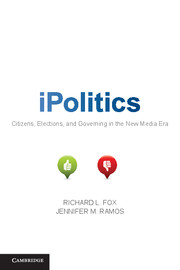Book contents
Preface and Acknowledgments
Published online by Cambridge University Press: 05 June 2012
Summary
As we complete this manuscript, countries in the Middle East and North Africa are experiencing protests and riots against ruling regimes. Despite government efforts to block them, new media tools such as YouTube, Twitter, and Facebook are enabling citizens to organize and share their frustrations with one another and the world. Amid antigovernment demonstrations in Egypt, for instance, the regime shut down the Internet for days. Of course, it was too late; President Hosni Mubarak stepped down after almost 30 years in power. The situation in Egypt is only one example of how new media and communication tools are being used to transform politics. By the time this book reaches readers, it is likely that there will have been additional events in which new technologies played a pivotal role in determining political outcomes. In this volume, we have endeavored to put together a collection of works that provides a context for understanding how these changes in the media and information environment are affecting politics today and how they may continue to transform politics in the future.
In spring 2010, the Institute for Leadership Studies at Loyola Marymount University, Los Angeles (LMU), invited leading scholars to its eighth annual Dilemmas of Democracy conference focused on new media and politics. As conference organizers, we were particularly interested in compiling analyses of both U.S. and non-U.S. new media environments as they relate to politics. We are pleased to have the contributions of those who participated in the conference: Matthew Baum, Ann Crigler, Richard Davis, Urs Gasser, Jan Gerlach, Lauren Hume, Jeffery Jones, Marion Just, Parker Hevron, Matthew Kerbel, Jennifer Lawless, Jesse Mills, Lauren Mintz, and Deborah Wheeler. We were also able to add contributions from Tom Carlson and Kim Strandberg, and Zoe Oxley. We thank these scholars for their time and effort.
- Type
- Chapter
- Information
- iPoliticsCitizens, Elections, and Governing in the New Media Era, pp. xvii - xviiiPublisher: Cambridge University PressPrint publication year: 2011



